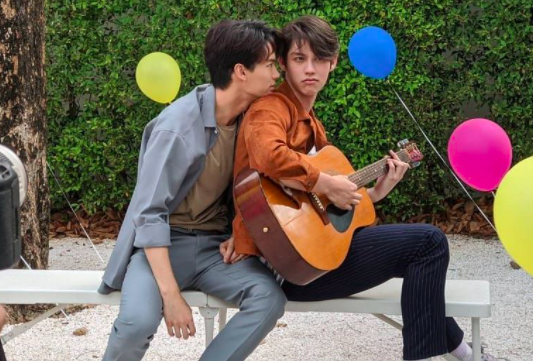The Appeal of ‘Boys Love’ Drama Series
Although same-sex marriage is only legal in one country in Asia (Taiwan), there is growing tolerance and support towards the LGBTQ+ community. A small part of this can be attributed to a rising sub-genre in TV – Boys Love (BL) series – which depicts relationships between male characters. Most prominently produced in East and Southeast Asia, the genre has garnered popularity throughout the continent, and even found a dedicated international fanbase. These series have provided solace and comfort for members of the LGBT community in countries where being LGBTQ+ is often frowned upon, and have even influenced some people who were previously hostile to perceive same-sex couples more favorably.
The concept of Boys Love originated from Japan and the genre of yaoi – homoerotic fiction primarily created by women, for female audiences. In yaoi, the couples consist of a masculine boy and a more typically feminine boy. BL series are usually adapted from BL novels, such as ‘SOTUS’, ‘Accidental Love’ and ‘TharnType’. In Asia, the main producers of BL series are Taiwan and Thailand. BL was initially incorporated as subplots in non-BL series, like ‘Slam Dance’ and ‘My Dear Loser: The Edge of 17’. The 2014 series ‘Love Sick’ was a major turning point for the genre, as it featured two male leads in a relationship, for the first time in Thailand. The main consumers of BL are teens and young women, so efforts are focused on recruiting handsome actors with good on-screen chemistry to play the main roles, in order to attract more viewers. Characters in BL series seem to reflect the desires of young women – many of the leads are college students who are dependable and attractive. According to the BL director Aam Anusorn, who directed ‘2Moons2’ and ‘Present Perfect’, women enjoy watching BL because, “they see a sensitive side of men that is not present in everyday life.”
Thai and Taiwanese BL series are well-received in their own countries of production, largely because these societies are already relatively accepting of the LGBTQ+ community compared to other Asian countries. In Thailand, there is a lot of freedom of gender expression, and in Taiwan, same-sex marriage has been legal since 2017. LGBTQ+ politics in both countries have been influenced by their national cultures, allowing the local entertainment industry to spurn out content touching on these themes. However, many members of the LGBTQ+ community shun BL series, due to their inaccurate representations of the community. They argue that BL series focus too much on romantic fantasy, consequently sweeping more serious LGBTQ+ issues like equality and AIDS/HIV under the rug.
The plotlines of BL series tend to follow standard tropes in romance dramas, although some may not be realistic when applied to real-life same-sex couples. One common trope is some kind of conflict or tension between the two male leads, who eventually fall in love. Usually, one of them has never shown any indication towards homosexuality, and the other, (or sometimes both), already has a girlfriend or female love interest. Another trope is that the male leads, in many cases, never explicitly state that they are gay or bisexual, despite being in a relationship with a man. Furthermore, there is a lack of empowering female characters, which is baffling since the authors are usually women themselves. However, the genre has been evolving over the past few years, and has gradually come to feature more accurate representations of LGBTQ+ people and women. For example, Tharn in ‘TharnType’ explicitly identified as gay, Pete and Kao in ‘Dark Blue Kiss’ openly discussed their sexualities, and shows like ‘My Dear Loser’ and ‘Together With Me’ offer more positive representations of women.
Whilst some people fetishize homosexuality, which is problematic in itself, BL could advocate for LGBTQ+ representation in Asia. LGBTQ+ fans in conservative countries in Asia have found solace when watching BL series, as they can identify with the male leads. This has helped LGBTQ+ viewers in such countries to accept or come to terms with aspects of their own sexuality or identity. Viewers have stated that watching BL makes them feel represented in the media, and thus more confident. Furthermore, the positive online community of the fandom advocates for inclusivity and LGBTQ+ support, placing emphasis on acceptance and open-mindedness. By centering on queer narratives, this genre is influencing people to perceive the LGBTQ+ community more favorably, especially in East Asian countries that still frown upon same-sex relationships.
There is no doubt that BL series from Thailand and Taiwan are reaching international audiences and resonating with them. While it was airing, the most popular BL series ‘2gether’ topped social media trends across Asia, triggering an abundance of conversations in many different languages. Furthermore, the lead actors, Bright and Win, garnered over a million followers on Instagram in just a few weeks. Millions of viewers tuned in to watch series like ‘2gether’ on Netflix and YouTube, especially during lockdown, when people were looking for new content to binge-watch. On LINE TV, (which broadcasts many popular BL series), viewership jumped from 5% in 2019 to a whopping 34% in 2020.
In the future, BL will continue to grow in popularity. Already, other countries like Japan and Korea have started dabbling in the production of BL drama series. Dedicated fans are continuing to promote BL series and their favorite actors on social media, which has had long-lasting consequences through reaching wider audiences. Beyond depicting wholesome and heart-fluttering love stories, Asian BL series possess the potential to gradually allow people to become more open-minded towards the LGBTQ+ community.
Sources:
https://www.timeout.com/bangkok/lgbtq/thai-boys-love-culture
https://i-d.vice.com/en_uk/article/5dzyqd/the-complex-phenomenon-of-boy-love-dramas
